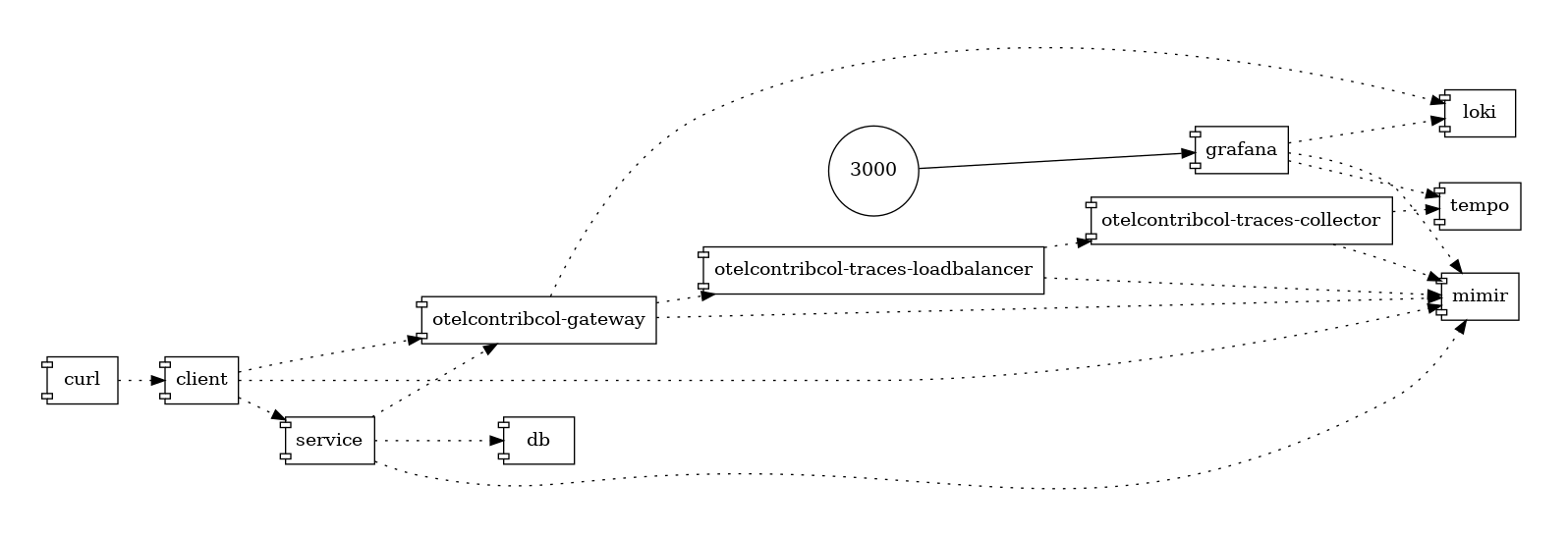o11y-weekly
Deep Dive Demo
Disclaimer
⚠️This demo is not a grafana labs production ready demo and used as local dev hands on and demo only.
Security, scalling and so on will not be introduced and GrafanaCloud offers the best experience and a no brainer solution to start with.
Architecture
This demo includes 2 java services (service and client) and a postgres database to use webserver and jdbc instrumentations.
OpenTelemetry Collector Contrib has been used as a Gateway and Agent

Run locally
Run the docker compose
git clone git@github.com:o11y-weekly/o11y-weekly.github.io.git
cd o11y-weekly.github.io/2024-01-31_OpenTelemetry_Looks_Good_To_Me/demo/
./up.sh
Run Grafana
Open Grafana: http://localhost:3000
2 folders:
- App: contains app dashboards
- OpenTelemetry Collector Contrib: Agent and Gateway monitoring
Grafana Dashboards
Java
1 Java dashboards are available:
OpenTelemetry Collector Monitoring
Deep Dive
Java Instrumentation setup
Automatic instrumentation
Reference : Automatic instrumentation
Manual instrumentation
Reference : Manual instrumentation
Setup Metrics instrumentation and exporter
Micrometer combined with the otlp registry has been used to push metrics with OTLP to mimir:
Client pom micrometer otlp dependency
<dependency>
<groupId>io.micrometer</groupId>
<artifactId>micrometer-registry-otlp</artifactId>
</dependency>
management:
otlp:
metrics:
export:
enabled: true
step: 10s
url: http://mimir:9009/otlp/v1/metrics
# url: https://prometheus-prod-24-prod-eu-west-2.grafana.net/otlp/v1/metrics
# headers:
# Authorization: Basic ####
metrics:
tags:
deployment.environment: '${deployment.environment}'
host.name: '${host.name}'
service:
name: '${service.name}'
namespace: '${service.namespace}'
version: '@project.version@'
distribution:
slo:
http: 5, 10, 25, 50, 75, 100, 250, 500, 750, 1000, 2500, 5000, 7500, 10000
jvm: 5, 10, 25, 50, 75, 100, 250, 500, 750, 1000, 2500, 5000, 7500, 10000
Logs
2 different methods has been used to send logs to LOKI.
Scrapping the file is a conventional and standard method to seng logs with a agent and used in the service application while [pushing logs to a gateway] is quite new and used in the client application.
File Log
In the service application, Logback has been used to write the logs into a file log.
<?xml version="1.0" encoding="UTF-8"?>
<configuration>
<property resource="application.yml" />
<appender name="FILE" class="ch.qos.logback.core.FileAppender">
<file>log/${SERVICE_NAME}.log</file>
<append>true</append>
<encoder>
<pattern>timestamp=%d{yyyy-MM-dd'T'HH:mm:ss.SSSXXX}\tservice.version=${service.version}\ttraceId=%X{trace_id}\tspanId=%X{span_id}\tmessage=%msg%n</pattern>
</encoder>
</appender>
<root level="INFO">
<appender-ref ref="FILE" />
</root>
</configuration>
OpenTelemetry Collector contrib reads the file and forward logs to LOKI using the LOKI api.
Java Agent exporter
In the client application the Java agent sends log with OpenTelemetry embedded exporters.
Java agent command line (app command line) :
[program:app]
command=java
-javaagent:/app/opentelemetry-javaagent.jar
-Dservice.name=%(ENV_SERVICE_NAME)s
-Dservice.namespace=%(ENV_SERVICE_NAMESPACE)s
-Dhost.name=%(host_node_name)s
-Ddeployment.environment=%(ENV_DEPLOYMENT_ENVIRONMENT)s
-Dotel.resource.attributes=service.name=%(ENV_SERVICE_NAME)s,service.namespace=%(ENV_SERVICE_NAMESPACE)s,deployment.environment=%(ENV_DEPLOYMENT_ENVIRONMENT)s,host.name=%(host_node_name)s
-jar /app/main.jar
--spring.application.name=%(ENV_SERVICE_NAME)s
Traces
WithSpan attribute
Java Agent
OpenTelemetry Collector
Agent
Gateway
Traces Tail Sampling
Traces Tail sampling configuration:
processors:
tail_sampling/latency-error:
decision_wait: 10s
policies:
[
# skip traces where latencies are < 100ms
{
name: latency-policy,
type: latency,
latency: {threshold_ms: 100}
},
# keep only error traces by skipping 4XX errors
{
name: error-policy,
type: and,
and:
{
and_sub_policy:
[
{
name: status_code-error-policy,
type: status_code,
status_code: {status_codes: [ERROR]}
},
# exclude false positive like bad requests or not found
{
name: http-status-code-error-policy,
type: string_attribute,
string_attribute:
{
key: error.type,
values: [4..],
enabled_regex_matching: true,
invert_match: true,
},
},
]
}
}
]
OpenTelemetry Collector Contrib setup
Metrics
- Instrumentation: micrometer with otlp registry
- Collector: No Collector
Logs
Agent mode
Inside the service container, supervisord is used to run the agent like a kubernetes sidecar.
- Instrumentation: manual with logback and a file log
- Collector: OpenTelemetry Collector Contrib Agent which scrape the log file and send logs to loki.
OpenTelemetry Collector Agent configuration
receivers:
filelog/app:
include: [ /app/log/*.log ]
storage: file_storage/app
multiline:
line_start_pattern: timestamp=
operators:
- type: key_value_parser
delimiter: "="
pair_delimiter: "\t"
- type: move
from: attributes["service.version"]
to: resource["service.version"]
- type: move
from: attributes.message
to: body
- type: time_parser
parse_from: attributes.timestamp
layout_type: strptime
layout: "%Y-%m-%dT%H:%M:%S.%LZ" #2024-04-11T12:39:13.402Z
- type: remove
field: attributes.timestamp
- type: trace_parser
trace_id:
parse_from: attributes.traceId
span_id:
parse_from: attributes.spanId
- type: remove
field: attributes.traceId
- type: remove
field: attributes.spanId
resource:
service.name: ${env:SERVICE_NAME}
service.namespace: ${env:SERVICE_NAMESPACE}
host.name: ${env:HOSTNAME}
deployment.environment: ${env:DEPLOYMENT_ENVIRONMENT}
processors:
batch/app:
service:
pipelines:
logs/app:
receivers: [filelog/app]
processors: [batch/app]
exporters: [otlphttp/gateway/loki, debug]
No Collector mode
Inside the client app.
- Instrumentation: OpenTelemetry Java Agent
- Collector: OpenTelemetry Collector Contrib Gateway which sends otlp logs to loki
Gateway configuration to collect logs.
processors:
batch/loki:
service:
pipelines:
logs/gateway:
receivers: [otlp/gateway]
processors: [batch/loki]
exporters: [otlphttp/gateway/loki]```
## OpenTelemetry Collector Contrib Monitoring
### HostMetrics (node exporter)
Push host metrics to mimir
[OpenTelemetry Collector HostMetrics configuration](/2024-01-31_OpenTelemetry_Looks_Good_To_Me/demo/otelcontribcol/gateway/pipeline.agent.yml)
```yaml
exporters:
debug:
verbosity: detailed
otlphttp/gateway/mimir:
endpoint: http://mimir:9009/otlp
receivers:
# otelcontribcol metrics + host metrics
prometheus/gateway:
config:
scrape_configs:
- job_name: otelcol-contrib/gateway
scrape_interval: 10s
static_configs:
- targets: [0.0.0.0:8888]
hostmetrics/gateway:
collection_interval: 10s
scrapers:
cpu:
metrics:
system.cpu.logical.count:
enabled: true
memory:
metrics:
system.memory.utilization:
enabled: true
system.memory.limit:
enabled: true
load:
disk:
filesystem:
metrics:
system.filesystem.utilization:
enabled: true
network:
paging:
processes:
process:
mute_process_user_error: true
metrics:
process.cpu.utilization:
enabled: true
process.memory.utilization:
enabled: true
process.threads:
enabled: true
process.paging.faults:
enabled: true
processors:
batch/gateway:
attributes/gateway:
actions:
- key: service.namespace
action: upsert
value: gateway
- key: service.name
action: upsert
value: otelcol-contrib/gateway
resourcedetection/system:
detectors: ["system"]
system:
hostname_sources: ["os"]
transform:
metric_statements:
- context: datapoint
statements:
- set(attributes["host.name"], resource.attributes["host.name"])
- set(attributes["process.command"], resource.attributes["process.command"])
- set(attributes["process.command_line"], resource.attributes["process.command_line"])
- set(attributes["process.executable.name"], resource.attributes["process.executable.name"])
- set(attributes["process.executable.path"], resource.attributes["process.executable.path"])
- set(attributes["process.owner"], resource.attributes["process.owner"])
- set(attributes["process.parent_pid"], resource.attributes["process.parent_pid"])
- set(attributes["process.pid"], resource.attributes["process.pid"])
service:
telemetry:
metrics:
level: detailed
logs:
level: info
pipelines:
metrics/gateway:
receivers: [prometheus/gateway, hostmetrics/gateway]
processors: [attributes/gateway, resourcedetection/system, transform, batch/gateway]
exporters: [otlphttp/gateway/mimir]
Pipeline
Detailed metrics are providen from OpenTelemetry Collector which should be activated:
Telemetry service for OpenTelemetry Collector
service:
telemetry:
metrics:
level: detailed
logs:
level: info